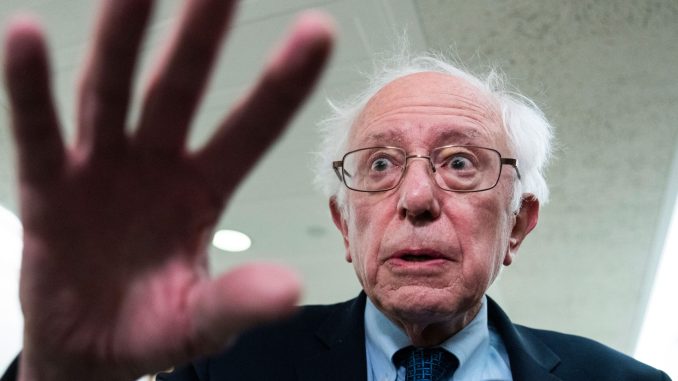
Lt. Hiroo Onoda hid in a Philippine jungle for three decades after World War II, devotedly carrying out his soldierly duties till 1974, when he returned to an unrecognizable Tokyo. Likewise, Bernie Sanders carries a torch for the proletariat, long after the rest of the Left has dumped the worker for race and sexual categories.
Even if you disagree with him—and you must if you understand basic economics and human nature, and have a passing knowledge of how socialist societies have ended up—you have to give the Vermont socialist senator some credit for steady commitment.
Onoda continued to venerate the emperor as a deity as he evaded raiding parties. Similarly, Sanders reveres economic determinism even as he, from time to time, is forced to mumble new pieties on climate, sex, and race.
On March 4, Sanders harrumphed to HBO’s Bill Maher that the Democratic Party had abandoned the worker:
When FDR was president, when Truman was president, even when JFK was president, you go out on the street and you say to people, “Which party represents the working class of America?” Most people I think … would’ve said the Democratic Party.
Today, you go out on the street, and that is not the sentiment. In fact, the Republican Party probably has more adherents than the Democrats.
Sanders went on to blame corporations and Republicans for this real shift in working class political sentiment—simply because if a Marxist doesn’t blame capitalism for rain, they take his Marxist card away. But what he said next did make sense:
So, you’re sitting out there somewhere in the Midwest. You can’t afford health care, maybe your job went to China, and you’re earning half of what you used to make. Your kid can’t afford to go to college, and you’re looking at people on television doing all of their stuff, and you are saying, “Who the hell gives a damn about me? Alright? Who cares what my life is about? Who’s addressing the crises facing my life, the pain that I’m experiencing?”
Sanders then spoke with real feeling about the “diseases of despair” savaging the working class—the alcoholism, the drug addiction, the concomitant falling life expectancy, and added, “We’ve got to restore hope to the American people. Working class are the majority of people in this country. They are hurting.”
Sanders knows well how the Left dropped the worker. But, as he knows all too well, to spell out how and why would be political suicide.
Starting in the 1960s, the men and women of the New Left embarked on a search for what socialist man of letters Irving Howe called “substitute proletarians.” The American industrial worker had shown zero interest in revolution. They wanted improvements in their working conditions, and the occasional vacation on the Jersey Shore, but were fervently patriotic.
“Almost everyone on the Left, but the Marxist remnants especially, was fervently on the hunt for a ‘substitute proletariat’—some agency that might yet undertake the historical mission assigned to the workers by Marxism,” wrote Howe in a very good essay for The New York Times Magazine in 1982, adding:
Some turned to blacks, some to Asian and African peasantries, some to the intelligentsia, some to homosexuals and—in the last, mad days of the Weathermen—even high school students. Revolution was ripped out of historical context, becoming a mere function of sacrifice and daring, all now dependent on the will of a self-chosen vanguard.
In 1964, in “One Dimensional Man,” the Frankfurt School’s Herbert Marcuse had already exasperatedly decried: “The people recognize themselves in their commodities; they find their soul in their automobile, hi-fi set, split-level home, kitchen equipment.”
Toward the end of that long complaint about America, Marcuse was more upbeat about the prospect for revolution. The vanguard to which Howe referred, said Marcuse, would come from “the substratum of the outcasts and outsiders, the exploited and the persecuted of other races and other colors.”
Howard Zinn, too, thought that “the traditional idea that the agent of social change will be the proletariat needs reexamination.” The workers, he wrote in 1968, “are bribed into silence with TV and automobiles.”
Soon, sex was added as a locus of potential revolt. The reason should be obvious: Your economic status in life is very fluid, but you can’t change your race or sex. (Newsflash!)
Sanders knows all this, but he can’t say a word.
Already he has come under withering criticism through the years as a man who is insensitive to racial issues. His 2016 political ad, a stirring paean to the American working class set to Simon and Garfunkel’s “America” was panned for showing Sanders surrounded by Vermonters, who tend to be mostly white, and, incredibly, for its “very white” soundtrack. USA Today said it “sparked diversity questions.”
In fact, during that campaign, Black Lives Matter protesters took to interrupting his speeches. In 2020, Politico tut-tutted that “a message stressing economic justice is not the best option; he needs to appeal explicitly to race.”
All of this shows why Maher suddenly appears to be the voice of reason. He has stayed in one place, while so much of the establishment has, lemming-like, jumped off Braindead Gap.
Sanders, meanwhile, must reach for the Marxist deck and pull out the “corporations” card as an explanation for the Left’s abandonment of the worker. Like Onoda, he’s caught in a time warp.
Have an opinion about this article? To sound off, please email letters@DailySignal.com and we’ll consider publishing your edited remarks in our regular “We Hear You” feature. Remember to include the url or headline of the article plus your name and town and/or state.

